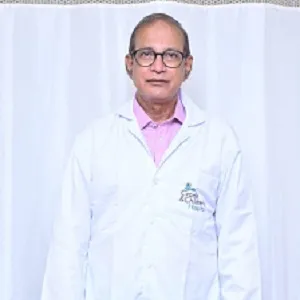What is ROP Screening?
ROP Screening is a recommended eye examination to diagnose any possibility of Retinopathy of Prematurity (ROP). All babies born with a body weight of fewer than 1.5 kgs, or are either born prematurely before eight weeks of their predicted date, should get at least one ROP screening session.
ROP is an eye condition that affects the retina’s blood vessels. It is very common in premature babies, and the ratio is around 65% of babies whose body weight lies below 1.25 kg.
In most cases, the condition always gets better for babies, and the ROP heals by itself. But, in some babies, this condition worsens over time, and treatment is of utmost importance. If the condition goes untreated, then the baby might turn blind or experience serious sight disorders.
ROP screening is the first step towards diagnosing the condition and determining its severity. Doctors make it mandatory for some babies that don’t naturally fall under the healthy birth category. It ensures that the health adversity can be controlled while there’s still time.
Risk Factors Associated with the ROP
The risk factors that might urge your baby to take an ROP screening test are as follows:
- Premature Birth
- Breathing Problems
- Infections or Associated Medical Problems
If any of these risk factors have been identified during your child's birth, your doctor will recommend that you get your baby ready for an ROP screening test. Doctors will conduct thorough diagnoses to ensure the baby needs a screening test.
It is because unwanted ROP screening might also adversely affect the baby’s health through temporary means, which include:
- Increased heart rate
- Decreased saturated oxygen levels
- Increased apnea events
These are rare and temporary conditions that have ideal treatments. But, a proper assessment is always advised for doctors before calling in for an ROP test. These tests are medically accepted because even the smallest amount of ROP can cause catastrophic health adversities for the baby if it goes unattended.
How to Prepare for the ROP Screening Test
The doctors will call you an hour before the surgery to add eye drops to your baby’s eyes. These drops ensure that your baby's pupil opens widely to get better visibility of the retina.
As per research, parents will be advised to feed sucrose drops to the baby and wrap them firmly to ensure they are calm during the ROP test. Once you have consulted the specialists, they will guide you to take instructions from the nurse to help prepare the baby for this test.
What to Expect from the ROP Screening Test
The first screening test will be recommended for the baby when he/she is within 4 to 6 weeks of age. Some of the babies just need one test, while most require two tests to ensure there is no chance of ROP development later in the future.
An ophthalmologist will be examining the retina and conducting the ROP screening test. He/she will be using an ophthalmoscope to place it gently over the retina of your baby’s eye. Some of the other important tools, such as a speculum or indentor, might be used to get a better view of the retina.
A speculum holds the baby’s eyelid open, whereas an indentor is useful for rotating the eye. The examination might not be painful, but it is uncomfortable for a baby. Anaesthetic eye drops are still used for babies to ensure they don’t feel any kind of pain around the area.
You must get in touch only with professional doctors who have experience in handling ROP screening tests.
Possible Results of the ROP Screening Test
After the doctor has checked all parts of your baby’s eyes, especially the retina, he/she will decide if your baby needs a follow-up visit to confirm whether ROP exists.
If ROP is found, then doctors will then take up the treatment procedures for curing the eyesight disorder at the earliest.
Conclusion
ROP screening is of the utmost necessity for premature babies and babies who have undergone treatments for breathing problems upon their birth. You must get in touch with the best doctors to go along with the test and determine if necessary treatment actions are to be taken.
Request an appointment at Apollo Cradle, Hyderabad - Jubilee Hills. Call 1860-500-4424 to book an appointment.
ROP occurs in premature babies because the blood vessels of the eyes aren’t fully developed when they are born.
ROP doesn’t get triggered in adults, but the condition can last for someone throughout their life. But, screening and management solutions on medical terms are possible at the earliest diagnosis.
There are no signs and symptoms of ROP in newborn babies, so the screening test is essential.
ROP screening is mandatory for all premature babies whose vitals are not considered healthy.
Your baby can go home after the screening if doctors approve. But you might have to bring them back for a follow-up visit, as required.
Our Doctors
Treatments
- Anaesthesia & Pain Management
- General Pediatrics
- Growth Chart
- Newborn Screening
- Pediatric Allergy
- Pediatric Dermatology
- Pediatric Endocrinology
- Pediatric Nutrition
- Pediatric Orthopedics
- Pediatric Psychology
- Pediatric Surgery & Urology
- ROP Screening
- Stem Cell Banking
- Vaccination/Immunisation Schedule

 95% Patient Satisfaction Score
95% Patient Satisfaction Score










